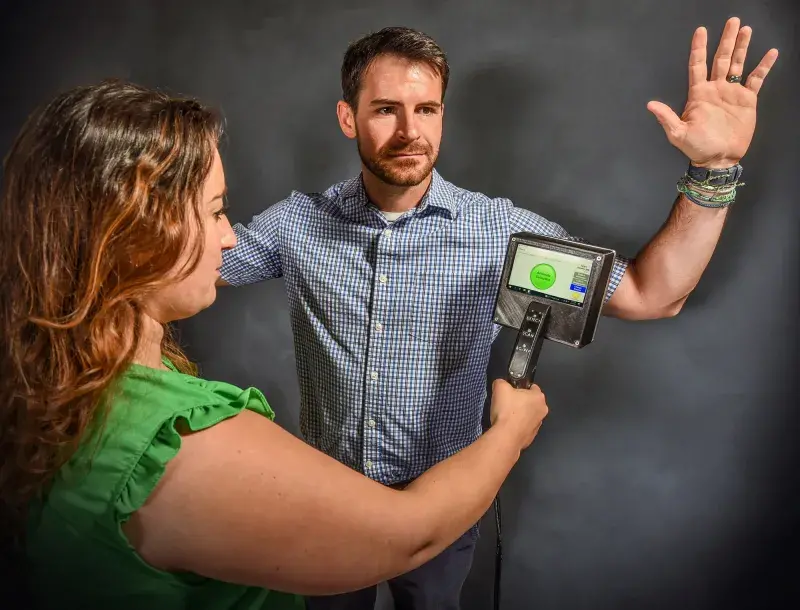Though pat downs are currently an essential element of keeping travelers safe at the airport, it slows the screening process for people waiting in line and can be an uncomfortable experience for the passenger being screened. Reducing the need for pat downs may soon be easier, including for passengers with limited mobility, thanks to the Science and Technology Directorate (S&T) Screening at Speed Program.

As threats to airport security have become increasingly sophisticated, S&T, alongside the Transportation Security Agency (TSA), is working to address emerging threats while also decreasing wait times. Screening at Speed, with funding and support from the Small Business Innovation Research (SBIR) Program is developing a handheld screening wand that could improve the checkpoint experience for countless passengers. SBIR enables the advancement of technologies through research, development, and innovation by making key investments in small businesses.
“We are happy to partner with the Screening at Speed program to advance checkpoint security capabilities,” said Dusty Lang, SBIR program director. “Screening at Speed’s successful track record with the SBIR Program is an excellent example of their smart, strategic program managers harnessing small business innovation and collaboration to yield the best research and development to meet TSA needs.”
In 2020, the Screening at Speed Program collaborated with the SBIR Program to publish the Handheld Advanced Detection/Imaging Technology System topic in the annual solicitation. This began the research and development of new handheld screening wands using millimeter wave X-ray technology and new cost-efficient 5G communications systems with three small business partners, through SBIR Phase I awards. In 2021, two of those small businesses, Spectral Labs Inc. of San Diego, California, and Luna Inc. (formerly TeraMetrix) of Roanoke, Virginia, were selected to develop screening wand prototypes that resolve passenger alarms and reduce the need for pat downs. Design concepts for the prototypes included a viewing screen in the wand to show where the threat is on the person (using automated algorithms that protect privacy while distinguishing between concealed objects and clothing or skin), a minimum of three hours of battery, and a targeted volume cost of $5,000 or less.
While handheld screening wands have existed for a long time, the main difference between the metal detecting wands we see at airports now and the innovative wands Screening at Speed is developing is that they can display the location of the prohibited item on the person via the viewing screen and that it can distinguish between metallic and non-metallic items and between skin and clothing.

These wands are also an improvement over current wands due to the millimeter wave technology that provides a higher resolution to better detect a threat item from a harmless object. By increasing this contrast in resolution, TSOs will be able to more easily determine if a passenger is carrying any non-permitted items.
Spectral Labs successfully tested their prototype this year at TSL and Luna Inc. will test their prototype by the end of the year to see if the firmware, speed, and image quality of the prototype meet TSA’s requirements.
After working with TSA to develop the improved screening wand prototypes, it became clear that the wands could also address the unique needs of passengers with limited mobility. Currently, individuals using wheelchairs or crutches receive pat downs if they can’t pass through an advanced imaging screening system that requires passengers to pause and pose as the screening system rotates around them. The millimeter wave handheld wand could allow TSOs to screen these passengers without touching or interfering with their personal space. The design for this additional prototype, which will provide higher resolution images than the handheld screening wands already developed, is underway. This device will allow TSA to screen passengers with limited mobility and will be submitted to TSL for mock passenger testing by the end of 2025.
“With development and implementation of these handheld screening wands, we aim to reduce the number of pat downs TSOs have to perform, which will also speed passenger time through the checkpoint and reduce inconveniences for passengers, particularly those experiencing limited mobility, improving the checkpoint experience for all passengers,” said Karl Harris, Ph.D., Screening at Speed program manager.
In partnership with TSA, the Screening at Speed Program will pursue development, final testing, and certification of the wands. Once a prototype is ready for commercialization, the screening wand could be used in a variety of environments. The multi-functional, touchless screening solution also enables on-demand security screening in environments where traditional screening systems aren’t in place. This will allow S&T to more efficiently support the mission of its fellow component agencies who protect our borders and more. Solutions could also be used to enhance security at large-scale gatherings and sporting events.
Development of contactless screening tools is a game-changing capability for reducing physical contact during screening and staying ahead of evolving threats. Maturing this technology creates a more robust and modernized screening device that is affordable, convenient, and works in a variety of environments and situations.
For related media inquiries, contact STMedia@hq.dhs.gov.
